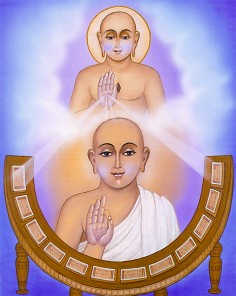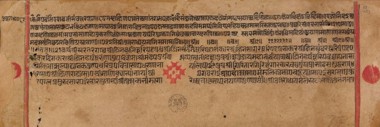Eighth Lecture: Kapila’s Verses [1]
By what acts can I escape a sorrowful lot in this unstable ineternal Saṃsāra, which is full of misery? (1)
Quitting your former connections place your affection on nothing; a monk who loves not even those who love him, will be freed from sin and hatred. (2)
Then the best of sages, who is exempt from delusion and possesses perfect knowledge and faith, speaks for the benefit and eternal welfare, and for the final liberation of all beings. (3)
All fetters (of the soul), and all hatred, everything of this kind, should a monk cast aside; he should not be attached to any pleasures, examining them well and taking care of himself. (4)
A stupid, ignorant sinner who never fixes his thoughts on the soul’s benefit and eternal welfare, but sinks down through hatred and the temptation of lust, will be ensnared as a fly is caught on glue. (5)
It is difficult to cast aside the pleasures of life, weak men will not easily give them up; but there are pious ascetics (sādhu) who get over the impassable (Saṃsāra) as merchants cross the sea. (6)
Some there are who call themselves Śramaṇas, though they are like the beasts ignorant of (the prohibition of) killing living beings; the stupid sinners go to hell through their superstitious beliefs.[2] (7)
One should not permit (or consent to) the killing of living beings; then he will perhaps be delivered from all misery; thus have spoken the preceptors who have proclaimed the Law of ascetics. (8)
A careful man who does not injure living beings, is called “circumspect” (samita). The sinful Karman will quit him as water quits raised ground. (9)
In thoughts, words, and acts he should do nothing injurious to beings who people the world, whether they move or not. (10)
He should know what alms may be accepted, and should strictly keep these rules; a monk should beg food only for the sustenance of life, and should not be dainty. (11)
He should eat what tastes badly, cold food, old beans, Vakkasa Pulāga, and for the sustenance of his life he should eat Manghu (ground badara). (12)
Those who interpret the marks of the body, and dreams, and who know the foreboding changes in the body (aṅgavidyā),[31] are not to be called Śramaṇas; thus the preceptors have declared. (13)
Those who do not take their life under discipline, who cease from meditation and ascetic practices,[4] and who are desirous of pleasures, amusements, and good fare, will be born again as Asuras. (14)
And when they rise (in another birth) from the world of the Asuras, they err about, for a long time, in the Saṃsāra; those whose souls are sullied by many sins, will hardly ever attain Bōdhi. (15)
And if somebody should give the whole earth to one man, he would not have enough; so difficult is it to satisfy anybody. (16)
The more you get, the more you want; your desires increase with your means. Though two māṣas would do to supply your want, still you would scarcely think ten millions sufficient. (17)
Do not desire (women), those female demons,[5] on whose breasts grow two lumps of flesh, who continually change their mind, who entice men, and then make a sport of them as of slaves. (18)
A houseless (monk) should not desire women, he should turn away from females; learning thoroughly the Law, a monk should strictly keep its rules. (19)
This Law has been taught by Kapila of pure knowledge; those who follow it, will be saved and will gain both worlds. (20)
Thus I say.
 Ganadhar Sudharma Swami
Ganadhar Sudharma Swami
